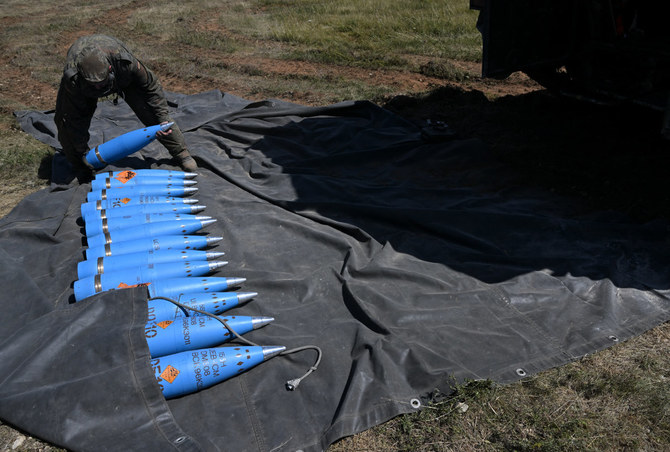FRANKFURT, Germany: Europe’s efforts to boost arms production and help Ukraine to fend off Russia’s invasion are facing an unexpected obstacle in a German local government.
The city council in Troisdorf, which has a population close to 80,000, has for the time being blocked plans put forward by a major arms company to expand production locally.
Citing development needs, the “no” by the western municipality near Cologne is calling into question the European Union’s ability to manufacture more weapons at a crucial time.
Earlier this year, the 27-member EU pledged to step up supplies of much-needed artillery shells to Ukraine as Kyiv’s forces faced shortfalls.
The mayor of Troisdorf rarely has a role to play in international politics, but the local official was called to account by German Defense Minister Boris Pistorius in parliament in early December for holding up the project.
Recognizing the risks, the popular minister urged local and regional authorities to work to speed up the rate of arms production.
“The pressure (...) is great because in Europe and in Germany there is a real bottleneck on ammunition,” Pistorius told MPs.
For weeks, Troisdorf has been at loggerheads with arms giant Diehl Defense, whose local factory produces the ignition devices needed for large quantities of explosives, such as rockets and missile charges.
These parts are used in the manufacture of the Iris-T air defense system, three of which have been delivered by the German government to Ukraine.
The Troisdorf site is an important link in Europe’s objectives to back Ukraine, as Kyiv urges its allies to supply it with more munitions at a time when it is struggling to repel the Russian offensive.
The EU has pledged to provide Ukraine with one million artillery rounds by March 2024 to aid in Kyiv’s fight against Russia.
To date, it has delivered about 300,000 rounds from its own stocks, now depleted.
German industry’s share of the EU plan should eventually reach 300,000 to 400,000 shells a year, more than three times the production at the time of the Russian invasion of Ukraine in early 2022, industry sources told AFP.
But Diehl Defense now sees the future of its Troisdorf site in serious jeopardy after the city decided to claim part of the business park where the group’s subsidiary DynITEC is based.
The arms manufacturer wanted to buy the land, which had been put up for sale by the former Dynamit Nobel weapons company, so that it could expand its production capacity.
For its part, the local authority is planning to convert the site, which is the size of 50 football pitches and ideally located near the city center, into homes and offices.
“By calling the Troisdorf site into question, the Federal Republic of Germany’s defense capability is being undermined,” warned Thomas Bodenmueller, a member of the Diehl Defense board of directors, in response.
A broad spectrum of city councillors, from the conservative mayor Alexander Biber to the ecologist Greens and far-left Die Linke — roughly two-thirds of the council — refused to sacrifice such a large area in the city center.
This is because, according to the local authorities, the production of explosives and combat devices requires huge protective zones around the factory which cannot be built on for safety reasons.
For Marie-Agnes Strack-Zimmermann, chair of the Bundestag lower house’s defense committee and a staunch backer of Ukraine, the position of Troisdorf’s mayor “is quite simply irresponsible.”
“This is about Ukraine, but also and above all about Germany’s security,” she told AFP.
For the time being, Biber remains unmoved.
Despite mediation meetings in the run-up to the Christmas holidays, no compromise has yet been found and he is not alone in his resistance.
Earlier this year, the Rheinmetall group, another flagship of the German arms industry, said it would not build a new ammunition powder factory in the Saxony region of eastern Germany.
The project had caused concern among the local population and with public acceptance lacking, Rheinmetall moved the project to another location in Bavaria.
While experts say Kyiv needs three million rounds of ammunition a year, Pistorius warned last month that the EU would likely fail to reach its March target of delivering even one million desperately needed howitzer rounds.
























